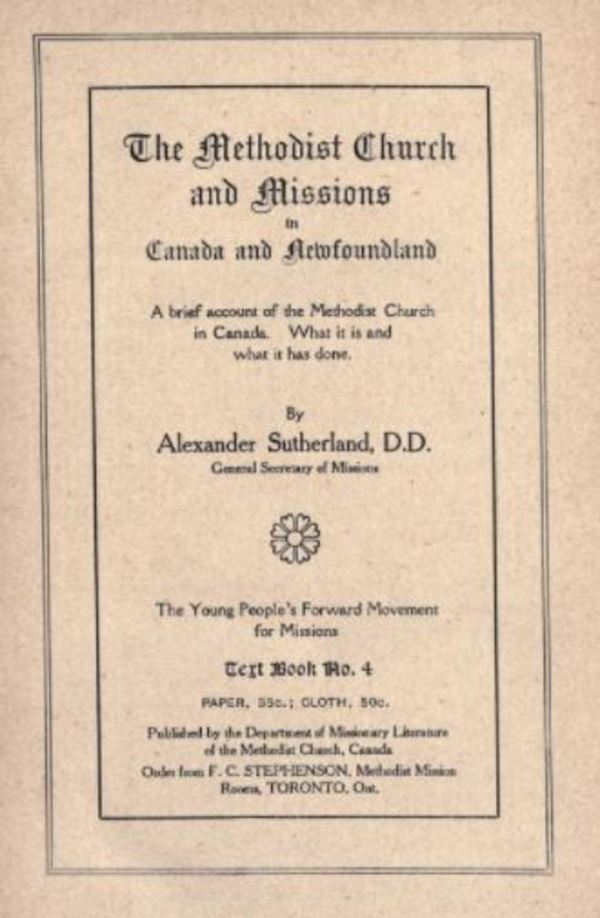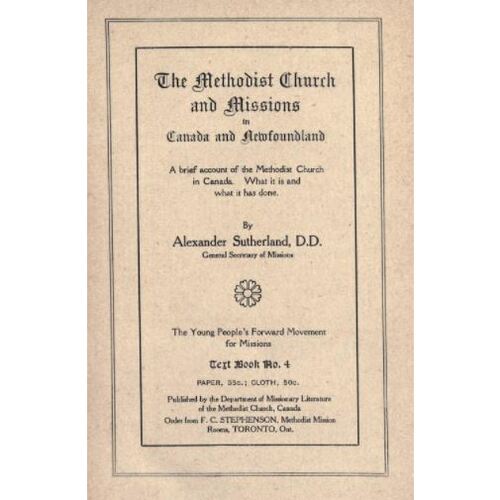
Source: Link
SUTHERLAND, ALEXANDER, Methodist clergyman, editor, and author; b. 13 Sept. 1833 in Guelph Township, Upper Canada, son of Nicolas Sutherland and Mary Henderson; m. 10 June 1859 Mary Jane Moore of Dundas, Upper Canada, and they had four sons, two of whom survived childhood, and three daughters; d. 30 June 1910 in Toronto.
Alexander Sutherland became a printer at the age of 13 in the town of Guelph and was active there in a Methodist Sunday school and in temperance organizations. In 1852 he was converted by the hymn-singing revivalist George Goodson and joined the Wesleyan Methodist Church. He was appointed exhorter for the Clinton circuit in 1855. The following year he was received on trial and assigned to the Galt and Berlin circuit. In 1858–59 Sutherland attended Victoria College, Cobourg, but the demand for itinerant preachers required that he abandon formal education and return to a circuit. He was ordained in 1859 into the Wesleyan Methodist Church in Canada.
Over the next 15 years Sutherland held pastorates in Hamilton (1864–66), Toronto (1867–72), and Montreal (1873–74), building a reputation as “one of the clearest and most forcible” preachers in the church. His theology was rooted in evangelicalism. In keeping with the increasingly liberal and sentimental spirit of the age, he objected to the “monstrous perversion” of orthodoxy that made God “a merciless tyrant.” He approved of the growing emphasis upon the love of God, the life of Christ, and the universality of atonement in Christian teaching. On the controversial question of “the final outcome of sin,” he took the moderate position that sinfulness resulted in banishment from God forever, rather than eternal punishment.
Sutherland, like his fellow preacher Henry Flesher Bland*, took a progressive stand on the relation of children to the church. They were not inherently evil, he maintained, and could avoid falling into sinfulness if they received a sound Christian and moral education. He was, therefore, a staunch advocate of the Sunday-school movement, and for a short time he edited the Sunday School Banner (Toronto). He believed in Christian nurture, rather than sudden conversion experiences, as the best means to create a strong church.
Convinced that “God raised up Methodism to do a special work . . . to spread Scriptural holiness throughout the land,” Sutherland feared that Canadian Methodism was failing in this mission because it lacked clarity about the meaning of Scripture. In 1873 he launched the journal Earnest Christianity (Toronto), “to save the church from sinking into utter spiritual paralysis,” but he had difficulty obtaining articles on Scripture. The periodical lost money, and after protracted negotiations with William Henry Withrow and the church’s book committee, it merged with the Canadian Methodist Magazine (Toronto and Halifax) in 1876. For Sutherland, the journal’s failure was an indication of the rising worldliness of his church.
Sutherland then placed his hopes for revival in missionary efforts. In 1874, with the creation of the Methodist Church of Canada, he had been named secretary-treasurer of its missionary society, headed by Enoch Wood*. In this capacity he began a series of missionary tours, one of the most extensive being to Manitoba and the northwest. After spending the summer of 1880 on the prairie, he reported that the church had the “opportunity of working out the problems of a Christian civilization on a purely virgin soil.” But the flourishing liquor trade and the disregard for the sabbath in the west made him realize that aggressive evangelization would be necessary.
Sutherland linked the church’s missionary program to settlement. Along with other Methodist clergy and lay entrepreneurs such as John Jacob Withrow*, he invested in the Saskatchewan Land and Homestead Company Limited, an enterprise created in 1882 “to induce Methodists to settle in centres where they can most easily and readily be supported with religious ordinances.” Although approximately 80 Methodists were settled at Crescent Lake (Sask.), the scheme was undermined by economic depression, delays in constructing railway lines, and the North-West rebellion [see Louis Riel*]. Sutherland, who was vice-president, struggled to maintain the support of investors, but the company was unable to sell any more land.
As Sutherland grew aware of the difficulties of raising money and finding missionaries, he became a determined advocate of a further union of Methodist churches. He thought these problems resulted from the lack of a central authority. Shall the Methodist church, he asked, “crystallize into a solid, compact body, or shall it resolve into a nebulous haze, without cohesion and without strength?” To Sutherland the question of union was an administrative matter, for on the crucial points of doctrine “absolute unity already existed.” He participated in the negotiation of church union in the early 1880s and successfully convinced his colleagues at the 1882 General Conference that a central administrative office of superintendent was necessary [see Albert Carman*].
On church committees, Sutherland was a keen and persuasive debater, although he had a penchant for ridicule and sarcasm when he was on the losing side. For instance, he bitterly attacked Nathanael Burwash* and Edward Hartley Dewart during the discussions in the mid 1880s regarding Victoria College’s federation with the University of Toronto. Federation would mean that important matters of curriculum and appointments would be considered from a totally secular standpoint. He was steadfast in his conviction that Methodist higher education should be endowed and sustained through the church.
Sutherland’s position on social questions remained conservative and based on evangelicalism. He regarded alcohol as the product of “satanic alchemy” and believed it was outlawed by the Bible. An unrelenting advocate of total abstinence, he called upon “every pulpit in the land” to “storm” at drink “with shot and shell” from the armoury of God’s word. By the mid 1880s Sutherland was frustrated with the absence of national legislation imposing prohibition, and he persuaded a bare majority of the Dominion Alliance meeting of 1887 to take independent political action by forming “Canada’s New Party.” Apart from absolute prohibition of liquor traffic, the platform insisted upon by an uncompromising Sutherland was an assortment of social reform objectives and criticism of the Catholic influence in Canadian life. In the 1890s, as the Methodist Church developed a social gospel, Sutherland’s dedication to reform remained rooted in the evangelical tradition. He emphasized that the creation of the kingdom of God began with the regeneration of individuals, not society. “Perpetual tinkering at laws and institutions” would not bring about fundamental reform. Indeed, Sutherland was alarmed that the Social Gospel, which seemed to him to concentrate on the material aspects of the kingdom of God, represented a dangerous secularization of Christian thought.
Throughout his career, Sutherland remained active in missionary work, having succeeded Enoch Wood as general secretary of the Methodist Missionary Society in 1878. In this capacity he oversaw the expansion of mission fields throughout the northwest, among immigrant communities in Canada, and to China, Japan [see George Cochran], India, Africa, British Guiana, and Korea. He had developed an administrative ethic that he thought consistent with Methodism. “Guard against mere impulse,” he wrote to a colleague in October 1880. “Remember we are Methodists therefore let nothing be done at random; but plan carefully and work by rule and method.” Despite his tight control, he was not able to avoid controversy and crisis. Most serious was the resignation in 1895 of the Canadian Methodist missionaries in Japan, who felt that the board of missions (as the missionary society was by then known), and Sutherland in particular, had failed to provide adequate financial and moral support. By 1906, Methodist clergy and laity had concluded that substantial reform of the board was needed to ensure continued progress. Sutherland’s responsibilities were reduced to overseeing the foreign missions. At the acrimonious General Conference of 1906, Sutherland attempted to defend his regime by proclaiming, “Whatever the Missionary Society of the Methodist Church is to-day, by God’s help I made it, and let no man rob me of my boasting.”
Despite this unfortunate conclusion to his long and invaluable service, Sutherland left an important legacy in his final years. His historical account, Methodism in Canada: its work and its story (Toronto, 1904), reflected the late Victorian view of Canadian Methodist history and has influenced subsequent generations of scholars. He argued that the story of Methodism in Canada was one of progress through the efforts of its missionaries. Not only had the church grown into a national institution, but it was also responsible for the establishment of religious equality, civil liberty, and the intellectual advancement of the nation.
Alexander Sutherland’s personal papers in UCC-C, 3182, include many of his sermons dated between 1883 and 1910, as well as his general correspondence and his private letterbooks. His official correspondence as general secretary of the Methodist Missionary Soc. is also found in the UCC-C, at 14/2/2 (copy-books of outgoing Alexander Sutherland corr.) and 14/2/4 (incoming Sutherland corr.). For papers relating to the Saskatchewan Land and Homestead Company, see AO, F 1006, no.29.
Sutherland’s writing can be traced through his editorials in the Sunday School Banner, Earnest Christianity, and the Missionary Outlook, all of Toronto; he also contributed numerous articles on missionary and theological questions to journals such as the Canadian Methodist Magazine (Toronto and Halifax). In addition to the work mentioned in the biography, his publications include: Erring through wine: a discourse delivered in the Richmond Street Church, Toronto . . . (Toronto, 1871); A plea for total abstinence (Toronto, n.d.); A summer in prairie-land: notes of a tour through the North-West Territory, (Toronto, 1881); “Shall the Methodism of the future be connexional or congregational?” Canadian Methodist Magazine, 16 (July–December 1882): 137–44; The proposed plan of college federation (Toronto, 1885); The final outcome of sin: a homiletical monograph (Toronto, 1886); The kingdom of God and the problems of to-day (Toronto, 1898); and The Methodist Church and missions in Canada and Newfoundland: a brief account of the Methodist Church in Canada (Toronto, 1906). Other books and pamphlets by Sutherland are listed in CIHM Reg.
Nathanael Burwash, The history of Victoria College (Toronto, 1927). J. W. Caldwell, “The unification of Methodism in Canada, 1865–1884,” UCC, Committee on Arch., Bull. (Toronto), no.19 (1967). J. [S.] Carroll, “The Rev. Alexander Sutherland, d.d.,” Canadian Methodist Magazine, 12 (July–December 1880): 1–4. Cook, Regenerators. Dent, Canadian portrait gallery. A.-N. Lalonde, “Settlement in the Northwest Territories by colonization companies, 1881–1891” (phd thesis, Univ. Laval, Québec, 1970). D. B. Marshall, Secularizing the faith: Canadian Protestant clergy and the crisis of belief, 1850–1940 (Toronto, 1992). Methodist Church (Canada, Newfoundland, Bermuda), Toronto Conference, Minutes, 1911: 13. J. T. Moore, The settler’s guide to homesteads in the Canadian north-west (Toronto, 1884). Neil Semple, “‘The nurture and admonition of the Lord’: nineteenth-century Canadian Methodism’s response to ‘childhood,’” SH, 14 (1981): 157–75. R. E. Spence, Prohibition in Canada; a memorial to Francis Stephens Spence (Toronto, 1919).
Cite This Article
David B. Marshall, “SUTHERLAND, ALEXANDER,” in Dictionary of Canadian Biography, vol. 13, University of Toronto/Université Laval, 2003–, accessed January 1, 2025, https://www.biographi.ca/en/bio/sutherland_alexander_13E.html.
The citation above shows the format for footnotes and endnotes according to the Chicago manual of style (16th edition). Information to be used in other citation formats:
| Permalink: | https://www.biographi.ca/en/bio/sutherland_alexander_13E.html |
| Author of Article: | David B. Marshall |
| Title of Article: | SUTHERLAND, ALEXANDER |
| Publication Name: | Dictionary of Canadian Biography, vol. 13 |
| Publisher: | University of Toronto/Université Laval |
| Year of publication: | 1994 |
| Year of revision: | 1994 |
| Access Date: | January 1, 2025 |



